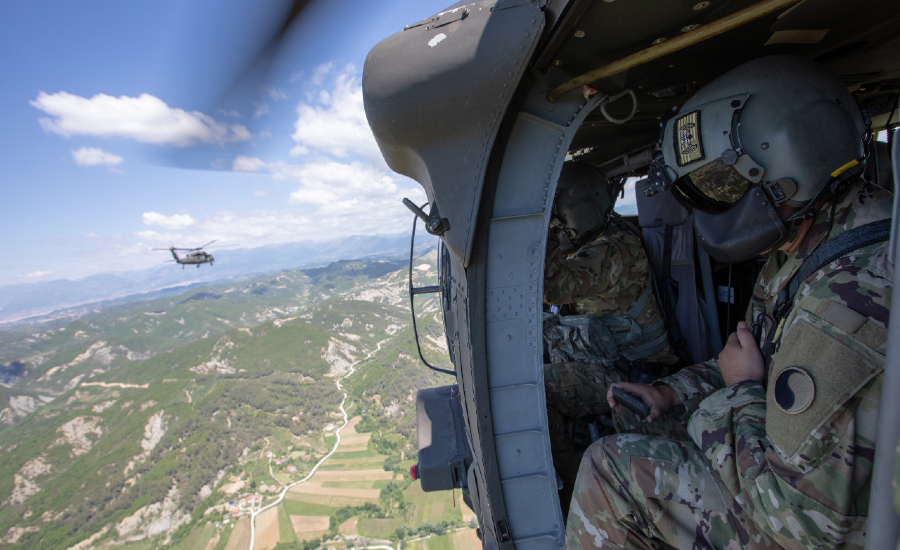The China Factor in U.S.-Albania Relations
Washington is strengthening its ties in the Western Balkans.

Published by The Lawfare Institute
in Cooperation With

Editor’s Note: Despite several interventions in the 1990s, the United States has largely treated Albania and other countries in the Western Balkans as a strategic backwater. Ilari Papa of the Washington Institute for Near East Policy argues this may be changing. Strategic competition with Russia and China is increasing the stakes in the region and the reasons for U.S. engagement.
Daniel Byman
***
In the first week of May, USNS Bob Hope, a U.S. Navy cargo ship, arrived in the Albanian port of Durres in preparation for NATO’s Defender Europe 21 military exercise. While NATO conducts annual exercises to boost interoperability and the coordination of its members’ capabilities, Defender Europe 21 stands apart for two reasons: It will be the largest operation in southeastern Europe since World War II, and Albania will play a significant role. Albania’s participation in Defender Europe 21 underscores its growing relevance to U.S. foreign policy in the Western Balkans in light of U.S. competition with Chinese influence in the region.
The region’s location—along the Mediterranean and at the intersection of Europe and the Middle East and North Africa—offers a valuable strategic access point. U.S. interests in the Western Balkans focus on security and stability. During Yugoslavia’s violent disintegration in the late 1990s, Washington increased its engagement in the region by leading NATO’s Operation Allied Force, which halted the Yugoslav regime’s assault against Albanians in Kosovo. Ever since, on paper at least, the United States has invested in conflict resolution (as between Kosovo and Serbia), the region’s integration into Western multilateral institutions, and the implementation of democratic reforms. However, U.S. policy toward the Western Balkans in general and Albania in particular has been characterized by neglect since the war in Kosovo. Washington has invested few resources in the region, content to play the role of bystander. In the case of Albania, Washington has had a limited role, prioritizing assistance to implement anti-corruption reforms and fight against organized crime.
U.S. Policy Toward Albania
Three developments indicate Albania’s potentially increasing importance to U.S. policy in the Western Balkans. First, Washington and Tirana have cooperated in the military sphere bilaterally and under the auspices of NATO. Albanian troops have supported NATO campaigns in Afghanistan, Iraq, Kosovo, the Aegean Sea and Latvia. More than 3,000 Albanian soldiers have joined U.S. and allied forces in Afghanistan since 2002, 99 of whom were on active duty in 2021 when President Biden announced the U.S. withdrawal. Another 1,343 Albanian troops participated in Operation Iraqi Freedom, earning the praise of Gen. Lloyd Austin, who worked with Albanian forces as commander of the Multinational Corps and is now the U.S. secretary of defense.
Albania’s involvement in Defender Europe 21 and its value as a U.S. partner stems both from these years of security cooperation as well as from the country’s strategic position on the Adriatic and Ionian coasts. According to the Department of Defense, the exercise “involves 28,000 U.S., allied and partner forces from 26 different nations,” with Albania committing 1,000 troops and six military bases across the country. In addition to helping allies streamline their military operations, Defender Europe 21 holds symbolic value, reassuring European NATO partners of Washington’s commitment to their security while sending a strong signal to Russia, which recently amassed troops across the border from Ukraine.
Another indicator of Albania’s potential importance to the United States is the budding economic cooperation between Washington and Tirana—though it remains limited relative to Albania’s other trading partners. Washington’s investments in the country have begun to increase recently. According to the Albanian Central Bank, “American [foreign direct investment (FDI)] surged at the end of the third quarter of 2020, rising 48 percent when compared to the same timeframe a year earlier.” Additionally, a 2020 U.S.-Albania memorandum of understanding set the stage for increased economic cooperation between the two countries. Following the signing of this memorandum, U.S. companies signed investment deals on two major energy projects in Albania: the Skavica hydropower plant and the Vlora natural gas power plant. If the ongoing projects in Skavica and Vlora yield fruitful results, more U.S. firms will likely enter the Albanian market. At this point, though, the United States does not play a significant role in the Albanian economy, through FDI or broader trade ties. European states have invested far more in the country, and U.S. trade is modest compared to imports from other major players like China or nearby Russia.
Finally, U.S.-Albania ties are also growing stronger in the diplomatic realm. U.S. soft power holds a strong grip on Albania’s populace—opinion polls consistently demonstrate that pro-American views are widely held, and in Gallup’s 2019 poll, 67 percent of Albanians said they approve of U.S. leadership. A large Albanian diaspora in the United States, President Woodrow Wilson’s advocacy for Albanian statehood at the end of World War I, and NATO’s Operation Allied Force in 1999 have contributed to Albania’s pro-American sentiment. This support among the population has facilitated U.S. efforts to help the country implement judicial reforms that aim to strengthen Albanian courts and counter corruption. Furthermore, Albania has joined Clean Network, an initiative launched by the Trump administration and that has continued under President Biden that aims to construct safe 5G infrastructure and data privacy standards and counter China’s dominance of the 5G market. U.S. Secretary of State Antony Blinken and Albanian Prime Minister Edi Rama reaffirmed Albania’s commitment to safe 4G and 5G networks by signing a memorandum of understanding in Brussels during the June 2021 NATO summit.
Albania—along with 38 other U.N. member countries, including the United States—also condemned China’s human rights abuses in Xinjiang, Hong Kong and Tibet. While Albania’s largely Muslim population’s sense of solidarity with Muslim Uighurs in Xinjiang partially motivated its denouncement of China’s human rights record, it is nonetheless a telling action considering that Albania receives Chinese investments under the auspices of Beijing’s Belt and Road Initiative. To put the matter in perspective, Muslim-majority countries in the Middle East not only have refrained from calling out China for its abuses of Muslim Uighurs, but they have even touted China’s repression as effective counterterrorism.
Albania has also stood in solidarity with the West regarding a set of U.S. foreign policy priorities, something that may prove useful for the United States as Albania joins the U.N. Security Council as a nonpermanent member in 2022. Tirana joined European countries and Washington in responding to the Skirpal poisoning in 2018 by expelling two Russian diplomats. Albania also won President Trump’s praise when it expelled Iran’s ambassador on national security grounds. That decision coincided with the U.S. “maximum pressure” campaign, which aimed to strong-arm Iran into renouncing its nuclear program and hostile agenda in the Middle East. These warm relations appear to be continuing under the Biden administration. At a meeting with Prime Minister Rama at the NATO summit, Secretary Blinken expressed the United States’s gratitude for Albania’s cooperation, including in the Defender Europe 21 exercise, and stated his hope for sustained collaboration between Tirana and Washington at the U.N. Security Council.
However, U.S.-Albania relations faced several bumps under Trump, some of which have continued in the Biden era. Tirana joined the EU stance and did not recognize Jerusalem as the Israeli capital in a U.N. vote in 2017. The country also remains part of China’s Belt and Road Initiative, notwithstanding U.S. skepticism about Beijing’s efforts to invest in terrestrial, maritime and digital infrastructure to connect the rest of the world to China. Albania aims to bolster its economy through foreign investment, and the government considers the Belt and Road Initiative as an opportunity for economic growth rather than an aspect of great power competition.
The most recent negative incident came in April, when Albania’s president, Ilir Meta, falsely accused U.S. Ambassador to Albania Yuri Kim of interfering in the country’s parliamentary election in favor of Prime Minister Rama. The accusation came on the heels of Kim’s condemnation of Meta’s calls for violence if Rama’s ruling Socialist Party won the election. The U.S. State Department also stoked some tensions in May when it doubled down on its effort to help Albania’s anti-graft campaign by announcing the public designation of the Albanian former president and prime minister, Sali Berisha, due to his involvement in significant corruption during his time in office. While President Meta and Berisha’s Democratic Party criticized the U.S. designation, Ambassador Kim underscored the importance of accountability and asserted that “nobody is above the law.”
Strategic Competition
Despite the occasional hiccup, U.S. relations with Albania have strengthened overall, and Albania’s relevance in U.S. policy in the Western Balkans has increased. One of the reasons behind the U.S. calculus is Washington’s focus on strategic competition with China. While Beijing’s trade and investment in the Western Balkans is low relative to other priority regions, it has made inroads in the region. China has focused mainly on Serbia, investing a total of $10.53 billion between 2005 and 2020, including in 16 energy, telecommunications, industrial and infrastructure projects over the past six years. But it has also bought a stake in Greece’s Piraeus port and invested in at least seven projects in Albania, including the Bushat Hydropower Station, the Tirana International Airport (though a private Albanian company won the tender to operate the airport in 2021) and “the most important oil producer refinery in the country.”
The more that China manages to penetrate the region, the higher the probability that the countries of the Western Balkans will grow dependent on Beijing and become vulnerable to its use of economic leverage for political gains. In the case of Albania, the United States has chosen to counter Chinese influence by raising awareness about its predatory investment policies, especially regarding its 5G technology, and by supporting democratic institutions and increased military and economic cooperation to bolster its alliance with Tirana as a bulwark against Chinese influence in the region.
Unlike Beijing, Washington cannot direct U.S. companies to do business in Albania. But the Biden administration should continue facilitating U.S. investment in the country’s energy and infrastructure sectors as an alternative to China’s Belt and Road Initiative. The United States should also keep offering technical assistance to help Albania implement anti-corruption reforms. In the meantime, Washington can urge the Albanian government to institute stringent foreign investment screening mechanisms to ensure that Albania’s cooperation with China does not raise security concerns. While the U.S.-Albania relationship still has plenty of room to grow, Washington’s proactive strategy of engagement with Albania could present a positive model of cooperation with allies in light of U.S. competition with China and other revisionist countries.





